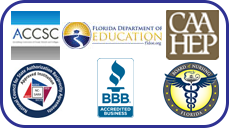Why would someone want to come to ICHS for the ASDS program?
Are you interested in pursuing the opportunity to play a crucial role in the world of Diagnostic Medical Sonography. Do you want to learn how to utilize Ultrasound technology to produce images of internal body structures aiding physicians in improving patient care.
There is a steady demand for skilled sonographers. The International College of Health Sciences offers a selection of specializations allowing you to follow your interest and expertise, whether in Obstetrics and Gynecology, Cardiac, or Vascular sonography.
Join us in a dynamic and rewarding profession, where each day brings new challenges and opportunities to make a meaningful impact on your life and the lives of others.
PROGRAM DESCRIPTION
81 Semester Credits
24 Months (Full-Time)
40 Months (Part-Time)
The Diagnostic Sonography program is an educationally broad based post-secondary program. This 24-month hybrid program is designed to provide the essentials of entry level sonographic medical imaging.
The curriculum leads the student through primary sonographic education with a concentration in the specialties of cardiac, diagnostic medical sonography (general) or vascular modalities. The program requires general education courses in General Physics, Anatomy & Physiology with labs, Algebra, Psychology, English, Statistics & Computer Concepts and Fundamentals of Speech. The sonography curriculum is designed to provide the competency-based, outcome-oriented, sequential didactic and scheduled laboratory and clinical activities necessary to achieve the program goals. The core and program curriculum devote significant time to developing "hands-on" laboratory skills in basic patient care and sonographic imaging techniques. The program curriculum requires that the candidate for the Diagnostic Sonography degree complete a concentration in one of the specific modalities; Cardiac, Diagnostic Medical Sonography (General), or Vascular. Each concentration provides students with the opportunity to prepare for a career in Sonography in their chosen modality. Assessments take place at regular intervals throughout the program evaluating the student’s progress towards specific levels of competency.
Program Description for Sonography with Cardiac Elective
The cardiac sonography elective is designed to provide the competency-based, outcome-oriented, didactic, laboratory and clinical activities necessary to achieve the program goals. This program prepares
the student to perform quality diagnostic echocardiograms that can be interpreted by the reading cardiologist. Graduating students ascertain an in-depth understanding of anatomy, medical terminology,
hemodynamics, Doppler modalities, and pathophysiology presented by a registered cardiac sonographer. Students learn the College’s general protocol that enables them to adapt to different clinics’ protocols, per the interpreting cardiologist’s specification. Professionalism and medical ethics begin at the College and are emphasized throughout the program to promote excellent patient care and safety.
Credential Issued: Associate of Science in Diagnostic Sonography
Upon completion of the program, the graduate is eligible to take the American Registry for Diagnostic Medical Sonography (ARDMS) exam or the Cardiovascular Credentialing International (CCI) exam. For additional information please contact the ARDMS at www.ARDMS.org or 1-800-541-9754 or Cardiovascular International at www.CCI.org or 800-326-0268.
Cardiac Echocardiography End-of-Program Student Learning Outcomes
- Maintain patient care and safety;
- Prepare for echocardiographic procedures;
- Perform echocardiographic imaging;
- Evaluate echocardiographic findings;
- Complete post-procedural activities;
- Apply principles of physics and hemodynamics;
- Demonstrate professionalism and collaboration within the healthcare setting.
Program Description for Associate of Science in Sonography Non-Invasive Vascular Study
The vascular sonography elective is designed to provide the competency-based, outcome-oriented,
didactic, laboratory and clinical activities necessary to achieve our program goals. The vascular program
prepares the student to perform diagnostic quality vascular ultrasound examinations that include, but are not limited to, cerebrovascular, upper, and lower extremities venous and arterial and abdominal
vasculature. The student will understand the anatomy, physiology, pathophysiology, and theory of the
vasculature of the human body as well as provide accurate technical impressions to the interpreting
physician. The student learns to work effectively with other allied healthcare professionals, patients, and
families to promote patient safety and an accurate diagnosis.
Credential Issued: Associate of Science in Diagnostic Sonography
Upon completion of the program, the graduate is eligible to take the American Registry for Diagnostic Medical Sonography (ARDMS) exam or the Cardiovascular Credentialing International (CCI) exam. For additional information please contact the ARDMS at www.ARDMS.org or 1-800-541-9754 or Cardiovascular International at www.CCI.org or 800-326-0268.
Vascular
- Maintain patient care and safety;
- Prepare for vascular ultrasound procedures;
- Perform abdominal/visceral examinations;
- Perform extracranial/intracranial examinations;
- Perform arterial examination of the upper and lower extremities;
- Perform venous examination of the upper and lower extremities;
- Perform hemodialysis examinations;
- Evaluate vascular ultrasound findings;
- Complete post-procedural activities;
- Apply principles of physics and hemodynamics;
- Demonstrate professionalism and collaboration within the healthcare setting.
Program Description for Associate of Science in Diagnostic Sonography – Diagnostic Medical Sonography (General) Elective
The diagnostic medical sonography elective is designed to provide the competency-based, outcome oriented, didactic, laboratory and clinical activities necessary to achieve our program goals. This program prepares the student to perform quality diagnostic studies that can be interpreted by the reading physician. Basic subjects explored include physical principles, abdominal, small parts, obstetrical, and gynecological sonography. The curriculum also devotes significant time to developing “hands-on” laboratory skills. Professionalism and medical ethics begin at the College and are emphasized throughout the program to promote excellent patient care and safety.
Credential Issued: Associate of Science in Diagnostic Sonography
Upon completion of the program, the graduate will be eligible to take the American Registry of Radiologic Technologists (ARRT) board exam. For additional information please contact the ARRT at www.arrt.org or 1-651-687-0048.
General Diagnostic Sonography
- Maintain patient care and safety;
- Prepare for abdominal, obstetric, and gynecological, and small part procedures;
- Perform abdominal imaging;
- Perform obstetric imaging;
- Perform gynecological imaging;
- Perform small parts- superficial imaging;
- Evaluate abdominal, obstetric, and gynecological findings;
- Complete post-procedural activities;
- Apply principles of physics and hemodynamics;
- Demonstrate professionalism and collaboration within the healthcare setting.
DEGREE PLAN
| COURSES | HOURS | ||
|---|---|---|---|
| GENERAL EDUCATION (total of 28 credits) | |||
| BSC1082C Anatomy & Physiology with Lab | 8 | ||
| ENC1101 English Composition | 3 | ||
| MAC1105 Algebra | 3 | ||
| STA2023 Introductory Statistics | 3 | ||
| PSY1012 Psychology | 3 | ||
| PHY2053 General Physics | 4 | ||
| SPC1017 Fundamentals of Speech | 3 | ||
| CGS1001 Introduction to Computer Concepts | 1 | ||
| DIAGNOSTIC SONOGRAPHY CORE COURSES (total of 35 hours) | |||
| DMS1010 Introduction to Diagnostic Sonography | 3 | ||
| DMS1030 Sonographic Principles & Instrumentation with Lab | 6 | ||
| EKG1010 Basic EKG | 2 | ||
| DMS1050 Clinical Application I | 6 | ||
| DMS2060 Clinical Application II | 6 | ||
| DMS2097 DMS Capstone I | 3 | ||
| DMS2070 Clinical Application III | 6 | ||
| DMS2098 DMS Capstone II | 3 | ||
| ELECTIVES Depending on the elective program you enroll in you, will have the following additional courses. (total of 18 hours) |
|||
| CARDIAC ELECTIVE COURSES | |||
| ECH1020 Echocardiographic Anatomy & Physiology with Lab | 6 | ||
| ECH1040 Echocardiography Pathology I/Pharmacology with Lab | 6 | ||
| ECH2030 Echocardiography Pathology II/Advanced Studies with Lab | 6 | ||
| --- OR --- | |||
| NON-INVASIVE VASCULAR ELECTIVE COURSES | |||
| VAS1010 Vascular Sonography I with Lab | 6 | ||
| VAS1020 Vascular Sonography II/Pharmacology with Lab | 6 | ||
| VAS1030 Vascular Sonography III/Advanced Studies with Lab | 6 | ||
| --- OR --- | |||
| GENERAL ELECTIVE COURSES | |||
| DMS1040 Sonographic Anatomy & Physiology with Lab | 6 | ||
| DMS1060 Abdominal Sonography I with Lab | 3 | ||
| DMS2080 Abdominal Sonography II with Lab | 3 | ||
| DMS1080 Obstetrics & Gynecological Sonography I with Lab | 3 | ||
| DMS2090 Obstetrics & Gynecological Sonography II with Lab | 3 | ||
| TOTALS | 81 | ||
TECHNICAL STANDARDS
DESCRIPTION |
SPECIFIC EXAMPLES |
| MOTOR SKILLS | |
| Abilities required of a candidate include gross and fine muscular movements, equilibrium, strength, for the handling of patient, self, and equipment. A candidate must have these abilities to provide safe care for patients in various states of mobility and awareness. |
|
| SENSORY (VISION, SMELL, AND HEARING) | |
| Visual, auditory, olfactory, and tactile senses must be sufficient enough to provide patient care, monitor and assess health needs, and to maintain a safe environment. |
|
| TECHNOLOGICAL | |
| The ability and skills to utilize current electronic, digital, and medical technologies. |
|
| COMMUNICATION | |
| Communication abilities sufficient for effective and sensitive interaction with faculty, students, physicians, patients, etc. in verbal and written form. |
|
| CRITICAL THINKING/PROBLEM SOLVING | |
|
Abilities required of a candidate include measurement, calculation, reasoning, analysis, and synthesis. Conceptual, integrative, and quantitative abilities are also required. A candidate must have these abilities to accurately perform sonographic technique to produce quality sonograms. |
|
| INTERPERSONAL SKILLS | |
|
The ability to interact successfully with individuals of all age groups and genders, families, groups, etc. from a variety of social, emotional, cultural and intellectual backgrounds. A candidate must have these abilities to provide empathetic support to patients where quality care is dependent on |
|
| ENVIRONMENTAL TOLERANCE | |
| The ability to work in a variety of environments and situations. |
|
PROGRAM DISCLOSURES
Program Outcomes: Consumer Information ![]()
The outcomes published on the consumer information page include:
- CAAHEP: retention, placement and pass rates on ARDMS and CCI certification exams;
- ACCSC: graduation and placement rates.







